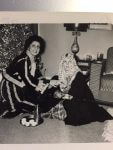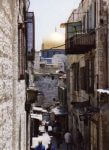Arab Americans prepare to celebrate Christmas
About half of Arab Christians celebrate the religious and secular holiday along with most mainstream Christians on Dec. 25, but the other half celebrates Christmas according to the old calendar two weeks later on Jan. 7.
By Ray Hanania
Christmas is both a time of Christian religious renewal as well as a time of spreading cheer and good tidings to the people around us. For Arab Christians, a fast disappearing minority, Christmas comes at two different times.
About half of Arab Christians celebrate the religious and secular holiday along with most mainstream Christians on Dec. 25, but the other half celebrates Christmas according to the old calendar two weeks later on Jan. 7.
Orthodox Christians will commemorate Christmas day on Saturday, January 7, but will also participate, respect and honor the Christian traditions of their non-Orthodox Catholic and Protestant Christian brothers and sisters by recognizing the holiday on Dec. 25. The difference is based not in the differences between each religion but in the change from the Julian, or Old World Calendar, to the Gregorian, or New World Calendar which made 14 days actually disappear.
That’s what Christians do.
The Julian calendar was implemented in 46 BC by Julius Caesar, who wanted a more accurate calendar for sowing and harvesting crops. In 1582, the Catholic Pope Gregory XIII issued a Papal order that changed the mathematics that was the basis of the calendar to better account of time that was being lost each year and that caused miscalculations in designating important dates like the Equinox and Easter, which is used by Christians as the start of their lives each year.
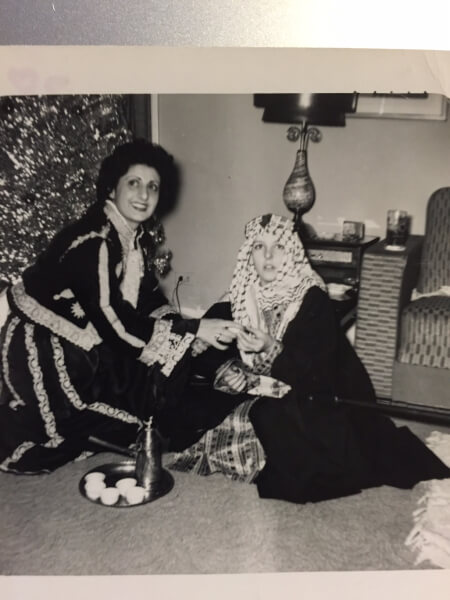
Christmas is both a religious holiday and a time of personal renewal not just in faith but also in humanity for Christians. The tradition of “giving” is a powerful force that not only helps others by rejuvenates the personal spirit.
The Christmas Season is about the bigger picture of spreading joy and goodwill. Christmas Eve and Christmas Day are times when Christians pause to remember their faith and express their belief in Jesus as the “Son of God” who died to allow the forgiveness of the sins of mortals.
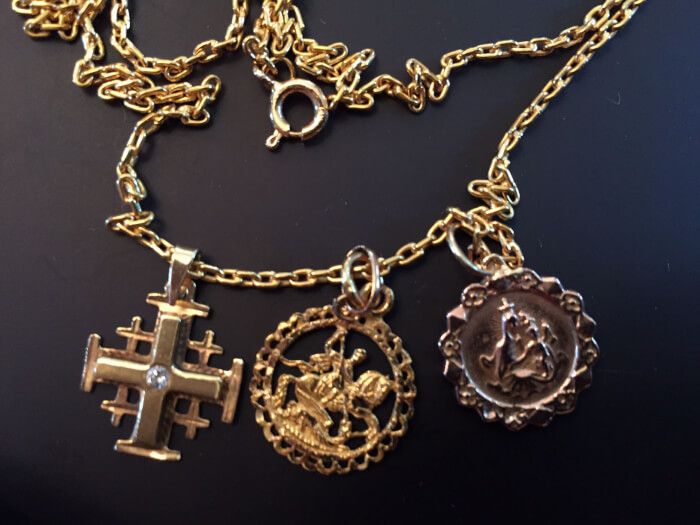
Christmas at our hoe began like it does for many Christians, Orthodox and non-Orthodox. As Orthodox Christians, we live in a non-Orthodox world in America so we adapted to the traditional Christmas celebrations on December 24 and 25th. After all, all of our neighbors celebrated Christmas on those dates and so did all of the country’s governments at the local, state and federal levels. You can’t just pretend it is not happening.
It never caused embarrassment, though. We would put up a Christmas Tree, a symbol of the secular non-religious aspects of the Christmas Spirit, along with most other Christians in America right after the conclusion of Thanksgiving. The Tree would remain near a front window of our home decorated in lights, tinsel and ornaments, some store-bought and others homemade.
When most traditional Christians would remove their trees after the New Year, Orthodox Christians would keep it up at least one week longer, allowing them to celebrate both Christmases or not appear to be outside of the Christian norm.
Decorating the Christmas Tree was also an important event that brought a family together. The tree, either live or more often a man-made replica — we had an Aluminum Tree — would be decorated and families would share a meal as they placed the decorations on the tree.
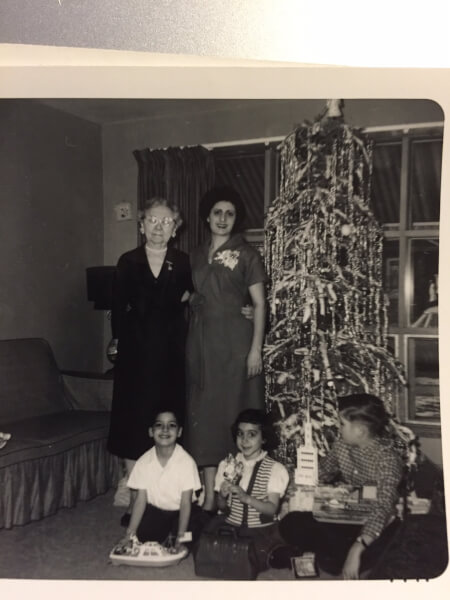
My family which combined the Catholic, Protestant and Orthodox traditions into one because of the mix of the religious beliefs among our relatives was fortunate because my mother’s side of the family originated from Bethlehem in Palestine where Jesus was born. My mother and her family lived near and attended services at the Church of the Nativity, the icon of Jesus in Bethlehem.
Bethlehem is a Holy Icon for all Christians, although many American Christians have forgotten the reality of the modernday roots of how Christians today suffer under Israeli occupation and also in the challenging world of increasing Islamic extremism and radicalization.
Many Christians have been targeted by Israeli extremists and by Islamic extremists who have distorted their own religious beliefs into blasphemy. Islam and judaism are religions of peace and tolerance just like Christianity. All three religions share fundamental beliefs. Christians are Jews who believe the Messiah is Jesus Christ, while Muslims are people who have taken both the Jewish and Christian religions one step further with the beliefs of the Prophet Mohammad. The Torah represents Jewish religious history and belief and is the basis of the Christian Bible. The Torah and the Bible are also a part of the Islamic Quran (Qur’an, Koran).
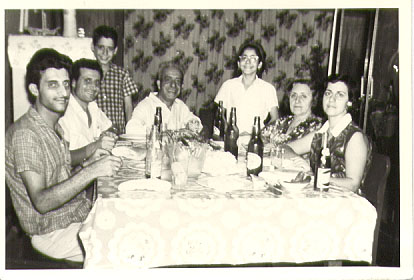
Christians religiously are closer in belief to Jews but many Jews reject Christianity as blasphemy. Yet those Christians, Muslims and Jews who can see past these differences best reflect the essence of their religions which all worship the same God.
Christmas in an Arab household would involve both a family get-together around the dinner table and participation in the religious services of their Churches. Usually, we would eat dinner and then celebrate Midnight Mass at the Orthodox Church.
The dinner table would feature popular Middle East foods like Mensiff, stuffed grape leaves and stuffed zucchini. The table would include hummus dip and tabouli, a diced salad. Christmas sweets including the most popular in recent years, Zalatimo, would adorn any true Christmas celebration dinner table or family gathering. The Zalatmo sweets include pistachios, walnuts and sweet syrup in a filo dough and crunchy wrap.
Incense is a very popular memory for many Orthodox Christians. The incense, made from aromatic plant matter, is burned in the Orthodox Church as a reminder of the tradition of sacrifice during Biblical Times. It was used in the Jewish Temples. The Orthodox Church uses a censer, a silver chalice that hangs on three long silver chains and is swung, lifted and dropped in the air to create a burst of the incense smoke that permeates the congregation during prayer. It usually has 12 bells as symbols of the 12 disciples and the Last Supper of Jesus. The Orthodox Priest would walk around the congregation lifting, dropping and swinging the censer to spread the incense while chanting prayers.
Many times my mom, after spending all morning and day preparing the dinner table meal, would spend the evening and the holiday doing embroidery. Palestinian embroidery provides the most beautiful and amazing meticulously created designs.
And when Christians of other faiths knocked at our door to sing Christmas Carols, a way to spread the Christmas Cheer, we would open the door, offer them hot cider or eggnog and sign with them, even if they were not Orthodox.
Being kind, generous and good to others is not unique to any religion and we should remember that acknowledging and supporting and participating into the traditions of others is a way to also reinforce our ownfaith.
Many who are not Christian view Christmas in the wrong way as being merely a religious celebration. Neither the Christmas Tree nor the character of Santa Claus are a part of the religious beliefs. They are mainly as symbols to bring families together. Santa Claus is merely another symbol of how good spirits and generosity are conveyed to others, especially children to spread good cheer.
I would love for you to share your Christmas Story in the comment sections below so others can better understand Christmas and its importance to the Arab People, the original Christians who originate from Bethlehem and Jerusalem.
Merry Christmas, everyone. Both the traditional Christmas and the Orthodox Christmas. And, if you are not Christian and are Jewish, Happy Hanukkah, a Jewish holiday that usually coincides with Christmas each year. And happy Holidays to Muslims whose own religious practices are sometimes not widely recognized by non-Muslims in America, but should.
(Ray Hanania is an award wining Palestinian American writer and columnist. He writes each week for the Arab News in Saudi Arabia www.ArabNews.com, contributes columns to TheArabDailyNews.com, the online news site for American Arabs, and for his personal website TheDailyHookah.com.)


- Israelisnipers shooting and killing hospital workers in Gaza - December 11, 2023
- CAIR Condemns Israeli Executions of Wounded, Unarmed Palestinian in West Bank - December 11, 2023
- Arab and Muslim American voters face a “simple choice” between Biden’s inhumanity and Trump’s edgy politics - December 9, 2023













